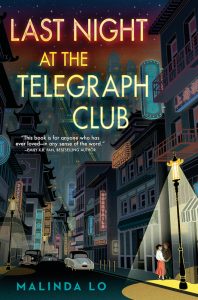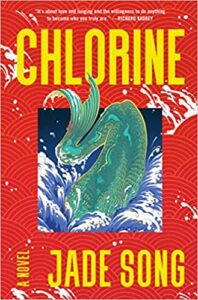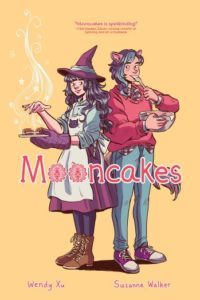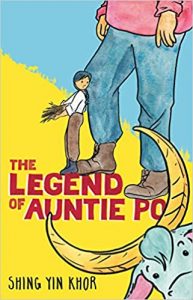Buy this from Bookshop.org to support local bookstores and the Lesbrary!
I’m embarrassed to admit I only just read this for the first time. I’ve read every other Malinda Lo book. I’ve had a copy since it first came out—in fact, I’ve owned two copies, because I also spent $100 on a signed hardcover (it was for charity, in my defense). In 2018, I read All Out, which contained a short story by Malinda Lo that would later be adapted into this book, and I said, “I’m eager to get my hands on the novel version“! I have no good reason for waiting three years to finally pick this up, but I’m happy to say that I loved it just as much as I knew I would.
If you somehow missed this bestselling, award-winning YA novel, it’s the story of a Chinese American lesbian teenager growing up in 1950s San Francisco. When she discovers the existence of a male impersonator performing at the Telegraph Club, she can’t resist the temptation, especially when a classmate says she has been there before and offers to accompany her. What follows is a bittersweet first love and coming out story that weaves in the political and social realities of the time period.
This is such an atmospheric, absorbing story. Lo does a great job of situating us in 1950s San Francisco Chinatown, and the inclusion of timeline pages show how Lily’s story plays out against bigger political events as well as her family’s history. Lily and her classmates do duck-and-cover drills in preparation of a nuclear attack. Her father is questioned for treating a supposedly communist patient. Her aunt works on technology that brings the U.S. one step closer to landing on the moon.
I couldn’t help feeling for Lily. She’s a very sympathetic main character, initially being pushed towards a prescribed path by her family and best friend. When she discovers the Telegraph Club—as well as a lesbian pulp fiction book, which she reads furtively in a corner of the drug store, she eventually is forced to choose between the future laid out for her and risking it all for a life of her own design.
Lily is some ways is naive: she starts the novel not knowing about the existence of queer people, and she questions throughout how you know that you’re in love. On the other hand, she also faces constant prejudice. As she discovers her own sexuality, she knows her family and community would judge her harshly for it. At the Telegraph Club, she’s the only Asian person—and often the only person of colour—there, and she’s tokenized by the other white queer patrons.
At one point, Lily mentions feeling split in two, like only the “good Chinese girl” is allowed through the door at her family’s house, while the queer half of her has to stay outside. This was such a powerful way to express being multiply marginalized, so rarely finding a space or community where you can be your entire authentic self. It’s heartbreaking, since Lily can’t walk away from either side of her identity.
The relationship between Kath and Lily felt realistic to first love: they’re both hesitant at first, even after it’s pretty obvious they’re both queer. They don’t know how to find the words to ask if the other person feels the same way about them. When they can’t contain their feelings anymore, it’s the kind of intense, overwhelming connection (both romantically and sexually) that you’d expect of a teen first love, but complicated by being mixed up with coming out.
Their relationship, while central to the narrative, isn’t the dynamic that stood out to me the most, though. There’s more complication and layers to Lily’s relationship with Shirley, her childhood best friend that she’s beginning to grow apart from. The two of them struggling to understand who they are to each other now, and whether they can still be friends at this point.
I appreciated the inclusion of several chapters from other points of view in previous years, including from her mother, father, and aunt. We get to see a broader look at the events that led up to Lily’s current life, including how her parents got together, how their plans to return to China were derailed, and Lily’s childhood growing up with her best friend. These chapters make the story feel bigger, almost like a family saga, even though the vast majority of the chapters are focused on Lily. They also make these side characters feel more well-rounded, which is crucial to how we interpret the ending.
(Spoilers in this paragraph) I’ve read a few different queer YA stories where teens are sent off to other family members to separate them from their partner/crush, and it’s always a traumatic experience for them. (For example, The Stars and the Darkness Between Them.) It makes sense that this is what Lily’s family would do to her, especially given the time period, but I appreciated Lo’s choice to skip over this part of her life. It allows us to end on a hopeful note, with Kath and Lily reuniting and Lily having more independence. (End of spoilers)
Maybe I put this aside for long because the hype was intense. Last Night at the Telegraph club has won some of the biggest awards YA books are eligible for, and it’s by far Lo’s most popular book—both in terms of readership and ratings. Any fears that this would fail to live up to this reception were misplaced, though: I honestly can’t think of any real flaws in this story. It is such a rich narrative that kept me immersed from beginning to end. This is a five star read and a new favourite. Whether or not you usually pick up historical fiction or YA, I can’t recommend this highly enough.
Content warnings: homophobia, racism, miscarriage, underage drinking





